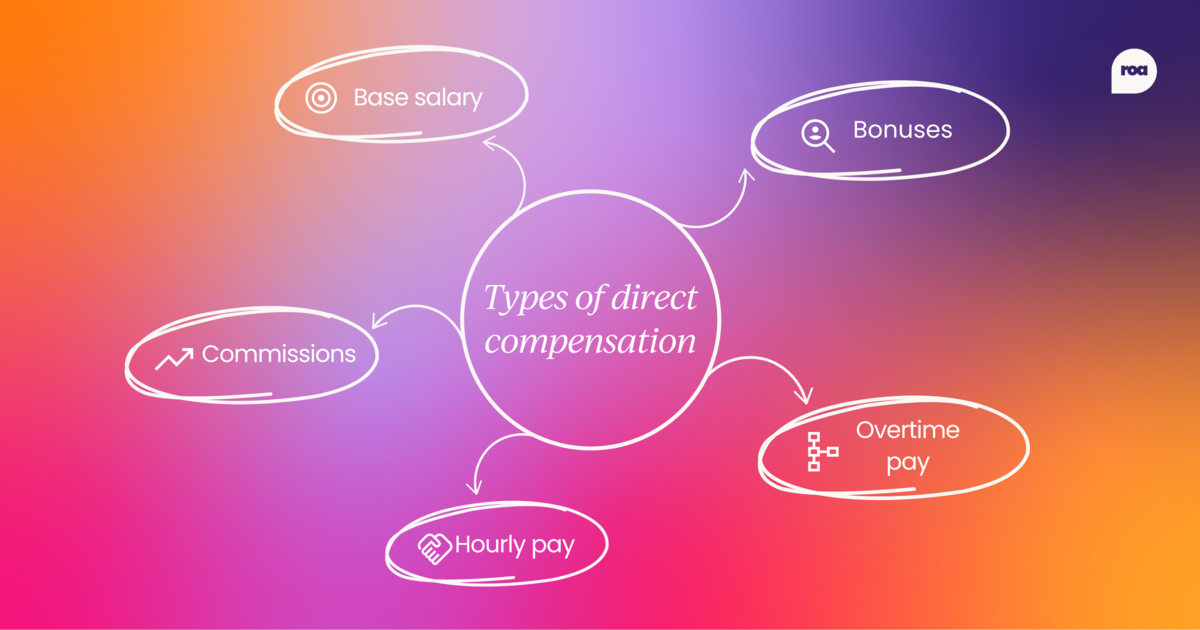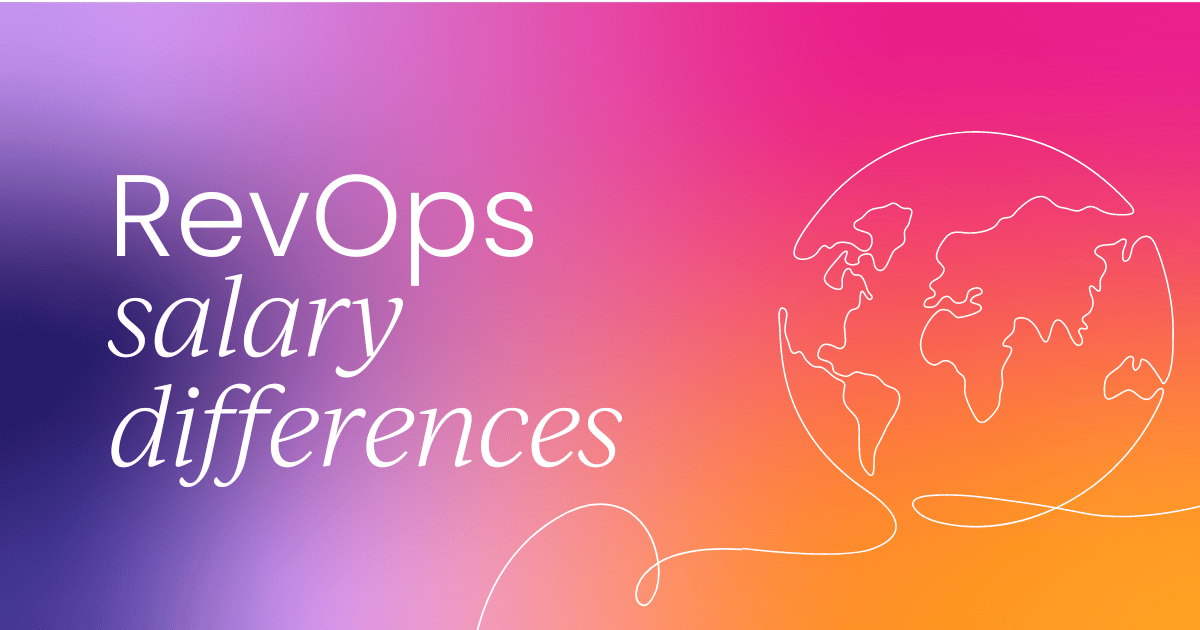What is direct compensation?
Direct compensation is paid out to employees as usable funds. It includes anything that appears in a staff member’s bank account as currency they’re free to spend as they like.
Direct compensation can be variable, as is the case with performance-based bonuses for salespeople and senior executives. Or it can be fixed, as is the case with the typical base salary.
What is indirect compensation?
Indirect compensation refers to “non-cash benefits” that have a set financial value, but aren’t paid out to employees as funds. Think anything you can’t spend instantly once you receive it.
Standard benefits usually fit the bill here. They’re contractually agreed, offered on a recurring or continuing basis, and are offered to many or all members of staff.
Why indirect compensation is important in revenue operations
Why do you need to know the difference between direct and indirect compensation in revenue operations?
If revenue growth stalls, you might find your org’s talent pool is the reason. That means you, or another department, will have to put your hiring hats on.
But there’s a problem.
From a strategic perspective, startups often have less budget to set aside for base salaries. But it’s tough to fill every job position on a salary below the market median.
If you want to attract (and keep) top talent, you’ll need to get inventive with your compensation plans.
• More cost-effective compensation
Offering more indirect compensation can be a cost-effective way of making your compensation plans more competitive.
This’ll help you hire and retain better job candidates.
Compensation is, therefore, a key part of solving skills problems in businesses.
From a RevOps perspective, solving those problems efficiently in ways that improve the company’s bottom line rather than hurt it, becomes a key responsibility (and challenge).
• Solving motivation problems
And it’s not just new hires that compensation practices apply to.
If you notice a motivation problem, you can get creative and collaborate with your people teams and HR to create new compensation plans that motivate your revenue-driving staff.
Aligning compensation incentives with company and department goals means better performance, and more growth.
Done well, this ends up improving the bottom line for the business, rather than hurting it.
• Retaining top talent
Eventually, you’ll find you have incredibly talented, hard-working people on your payroll.
These people will always have other opportunities, and other businesses will be keen to steal them away from you.
But holding onto them can get expensive. They may already be your highest-paid people, and sweetening their contracts year after year can require some creative thinking.
Fortunately, most people are motivated by more than just money. And many forms of indirect compensation also indirectly benefit the business, while being more cost-effective than direct compensation. A company car, for example, elevates the status of the person driving it at the same time as it creates a good impression on clients.
Meanwhile, non-financial incentives often cost the company little, while making staff feel specially valued. These incentives can be completely unique, imparting huge status boosts to the people receiving them. The closest car parking space, or the big corner office, can please an employee just as much a bonus bump, but at a fraction of the cost.
5 Examples of direct compensation

1) Baseline salary
Baseline salary is what most people think of when they think “compensation” of any kind.
This has to be the most basic type of direct compensation, because it’s fixed, and makes up the largest proportion of what most people are paid.
Salaries differ from hourly wages because a salary is paid to a staff member in exchange for them performing their job duties. Irrespective of how long it takes that member of staff to fulfill them.
If someone is paid hourly, they’ll earn more for jobs that take longer.
2) Hourly pay
Businesses that don’t pay their employees a monthly salary tend, instead, to pay them on an hourly basis.
These workers earn their pay at a particular hourly rate. The more hours they work, the more they earn.
Pay practices like these are common in less skilled jobs, or jobs where the amount of work is more variable. Supermarket restocking, grocery delivery, and other such jobs tend to offer contracts with an hourly rate of pay.
3) Overtime pay
Workers on an hourly wage earn at a higher, overtime rate when they work more than a given number of hours in a week.
4) Commissions
Companies use commissions to motivate employees in certain job roles to earn based on performance targets
Recruitment and sales, for instance.
Commissions are sometimes also paired with a low basic salary to further motivate members of staff to perform.
5) Bonuses
Unlike commissions, companies tend to pay out bonuses less frequently.
While a business will pay out commissions for performance on a monthly basis along with base salaries, it might only pay out bonuses once a year.
Bonuses can be performance-based, like commissions, but special bonuses are also possible. For example, some employers offer a one-time signing bonus for joining the company.

13 Examples of indirect compensation
1) Health insurance
No one wants to be left high and dry when their health fails.
So affordable health insurance policies for your staff will always go down well.
But it’s also in the company’s best interests to offer solid health insurance schemes.
If a key worker becomes sick, they immediately become less effective at work. If that illness becomes chronic, so does their impaired work performance.
The uncertainty of not knowing what the problem is, paired with the bodily drain of being unwell, saps your workers’ motivation. As well as their ability to do their job.
Solid health insurance policies ensure your staff feel comfortable claiming help as soon as they need it. And when those health issues are more serious, having that health insurance makes your staff feel lucky, garnering strong feelings of loyalty.
2) Life insurance
While health insurance is a must, life insurance is a nice additional perk. According to Statista, about half of all U.S. adults owned life insurance in 2023. This figure is down from 63% a decade earlier.
Life insurance gives workers peace of mind. They’ll know their family will be taken care of if the worst happens, and they’re no longer able to provide.
3) 401k and retirement matching (pension plans)
In many countries, employer matching for pension contributions is mandated by law.
But even where it isn’t, people appreciate their employer offering to match their pension contributions.
They see it as an investment in their future, and an act of generosity from their employer.
4) Childcare assistance
It’s rare today that a family can survive on a single income. Instead, two incomes are usually necessary if a family is to give its children strong opportunities.
Unfortunately, when both parents work, childcare becomes a necessity. And childcare isn’t cheap.
If you’re looking to hire people with experience, they’re probably a bit older. That means higher odds that they have kids. So they’ll appreciate financial help when it comes to childcare.
5) Tuition reimbursement
Some employees need continuing education to perform their jobs well.
This is very common in fast-moving industries and functions. Or where junior employees need specific skills that on-the-job training can’t provide.
In these instances, employees pay for courses and tuition themselves, but reimbursing them as the company immediately benefiting from these skills is a nice way of indirectly compensating them.
This is attractive to staff because they get to invest in themselves and bolster their résumé of skills, without leaving themselves out of pocket.
6) Paid time off (PTO) / vacation time
Offering more paid leave positions an employer as generous and trusting.
Employees will always appreciate being trusted to work hard, and then rest. Burnout is real, and driving your staff into the ground without any paid time off is a bad move.
7) Paid medical leave, bereavement leave, and paternity/maternity leave
Life happens. People want the security to know that, when things go wrong, their employer won’t punish them.
When your health fails, someone close to you passes away, or you have a child, it’s impossible not to appreciate an employer that shows compassion.
Being given the space to process the strong feelings associated with these events, and the time to do the work that comes with them, isn’t just the right thing to do from a moral standpoint. It breeds strong feelings of loyalty in your staff.
8) Equity and stock options
Especially in startups with a strong growth trajectory, equity and stock options can be very attractive means of compensation to employees.
In startups, there’s often a lot of future promise. But in the short term, cash is tight. As such, it’s difficult for startups to offer competitive base salaries, despite needing strong talent.
Imagine being one of the first devs working at Facebook. A base salary lower than the industry average might seem unappealing, but imagine what a handful of shares gifted to you in the company’s early days would be worth now.
Workers are aware of this, making equity and stock options very attractive to qualified candidates.
9) Flexible working
Flexible working arrangements give your staff the freedom to own their own work hours. Many companies have a “core working hours” policy, during which all employees have to be online and available. Outside of that, so long as the work gets done, people can make up the other hours in their workweek as they see fit.
Single-income families are less and less viable. As a result, flexible working policies are growing in demand. They give you and your colleagues the freedom to work around your children, caring for your parents, and the myriad household duties you have to perform.
10) Remote and hybrid working
Once people have been granted a particular freedom, they become very unhappy if it’s taken away from them. Much more so than if that freedom had never been granted to them in the first place.
So, since remote working has become commonplace, many workers will only consider a new role if it offers the same (or better) perks that they experience in their current role. That includes remote work.
But there are other benefits to having a remote working policy. Benefits with a direct and positive impact on the hiring company:
- Opportunities to hire from a larger pool of talent, not limited by geography.
- Keeps office space costs low.
11) Home tech budget
When you’ve got people working from home, it’s important they have the tools to do their job comfortably and sustainably.
Offering remote employees a small budget for a comfortable office chair, a good keyboard and mouse, and perhaps an external monitor goes a long way towards making members of staff feel valued.
If all goes well, it should also contribute towards them doing their job effectively.
12) Wellness programs
Health club memberships are expensive. To many, they feel like a luxury. But investing in the wellness of your employees makes good business sense.
Workers who clock in feeling refreshed, happy, motivated, and energized do better work than those who feel drained, tired, unhappy, and overwhelmed.
A well-stocked gym, or an evening in the pool and sauna can help.
Mental health resources, like therapy sessions, resources, and support, go a step further.
Many companies undervalue these aspects, but they’re all essential parts of Stephen Covey’s seventh principle of “sharpening the saw”. If you need to chop down a tree, you better make sure the blades are sharp. If you want your workers to do effective work, you have to make sure they’re not just pushing themselves towards burnout.
Wellness programs, discounted health club memberships, and mental health support are ways to differentiate yourself from other employers while investing in the sustained productivity of your staff.
13) Company car
The company car is perhaps the most classic form of indirect compensation.
If you have members of staff working in client-facing roles, symbols of status matter. If your field sales rep shows up to the client’s office in a shiny, high-end vehicle, it speaks volumes.
What’s more, just like the corner office, it’s a status symbol the member of staff will appreciate. They’ll feel elevated and valued, and they’ll directly tie those feelings to being a part of your company.

What about non-financial compensation?
While indirect compensation is made up of things with a clear financial value, and are often offered to all staff, non-financial compensation is made up of all other perks. These are usually tied to positions of seniority, and are typically status-related.
Crucially, and unlike examples of indirect compensation, these don’t have a clear financial value, and they can be things the company would retain if the employee were to leave.
Companies also don’t tend to offer them to many or all members of staff as standard. They’ll offer non-financial compensation to particular individuals in special cases.
For example, the big corner office that’s a cliché status symbol for many an office worker. That’s a form of non-financial compensation.
Other forms of public recognition, like an award at the end-of-year party, a simple change in job title, or even additional responsibilities, are also forms of non-financial compensation.
Here are some other examples of non-financial compensation:
- Leadership opportunities
- Awards for achievements
- Car parking spaces
- A private working space
- A larger office






